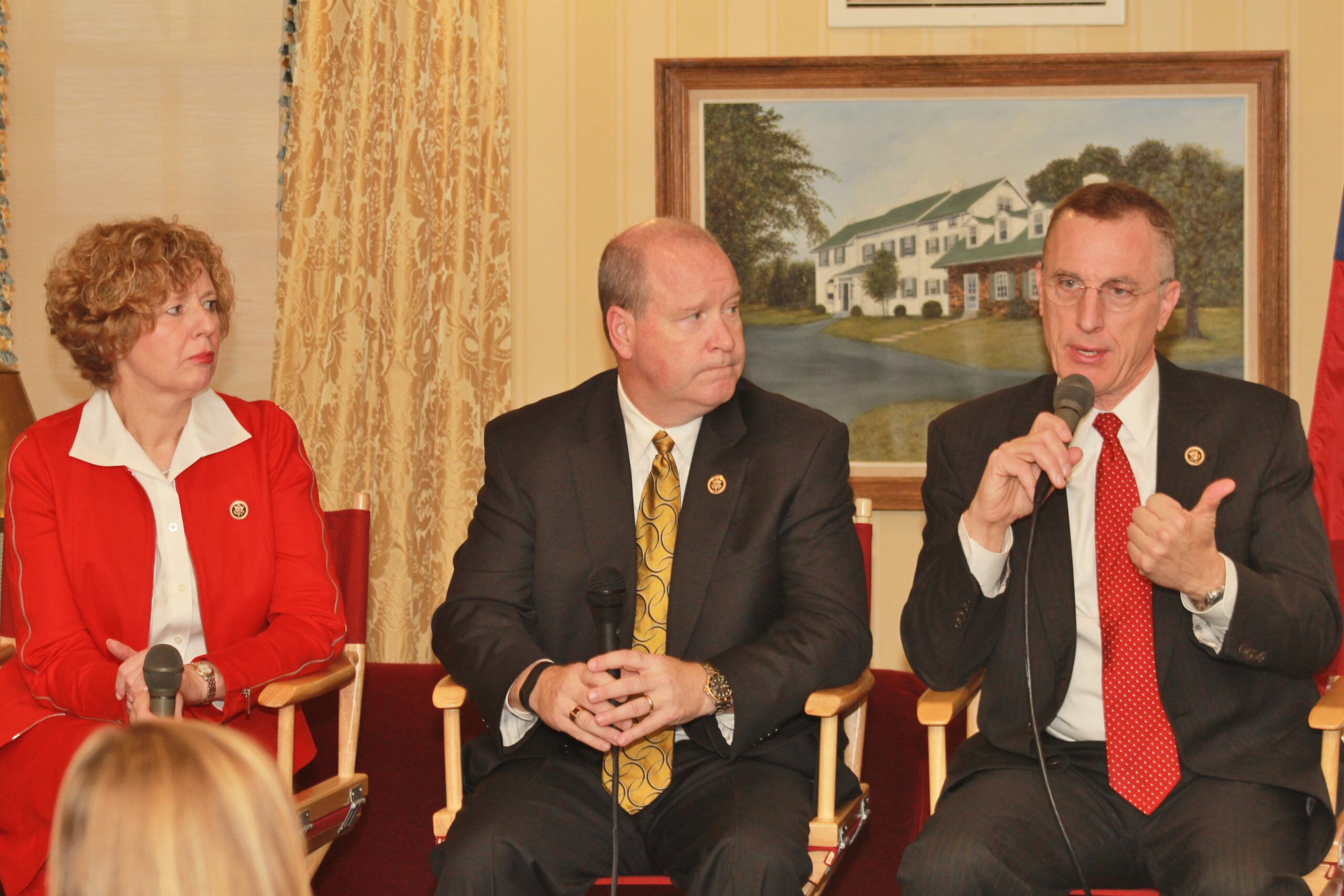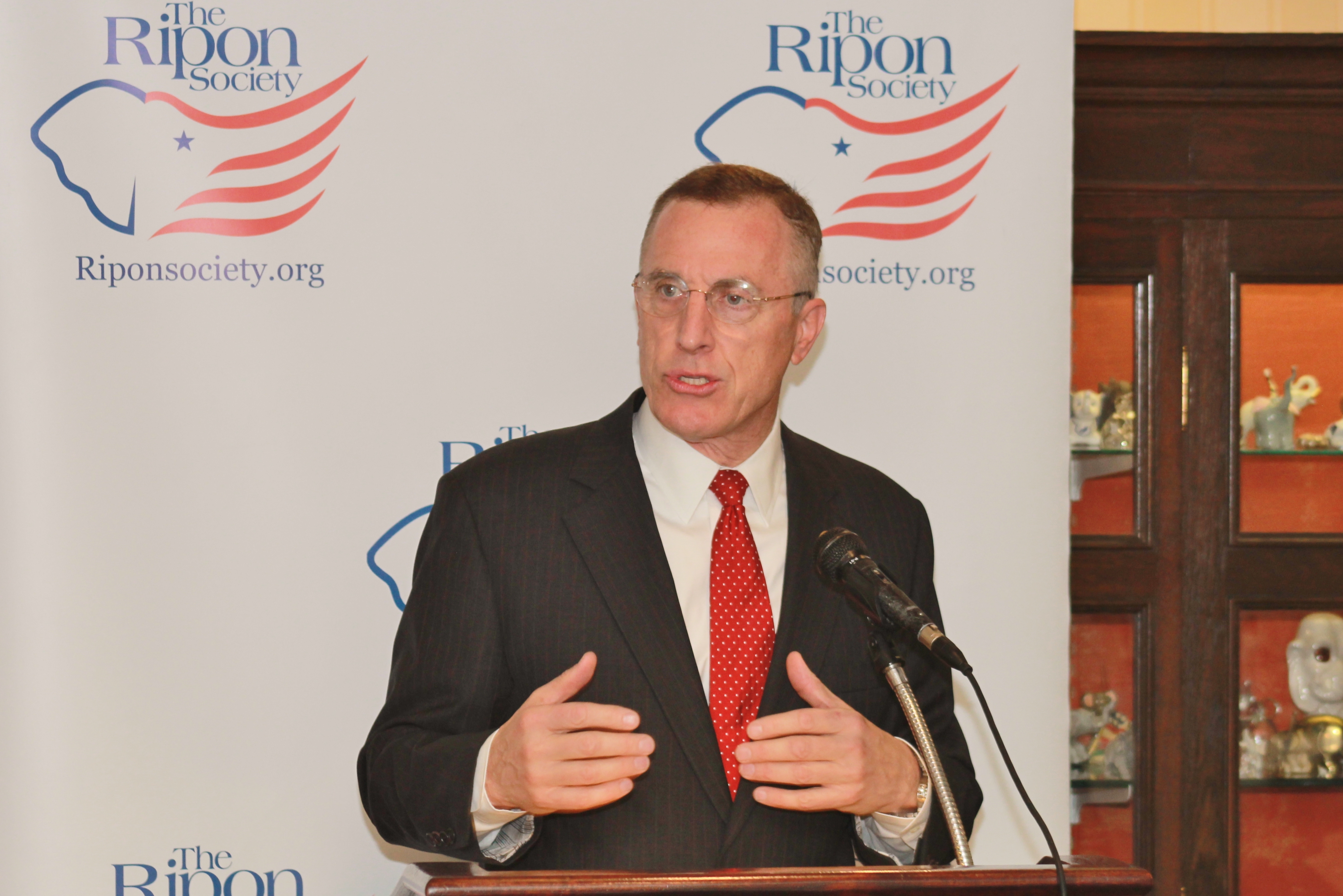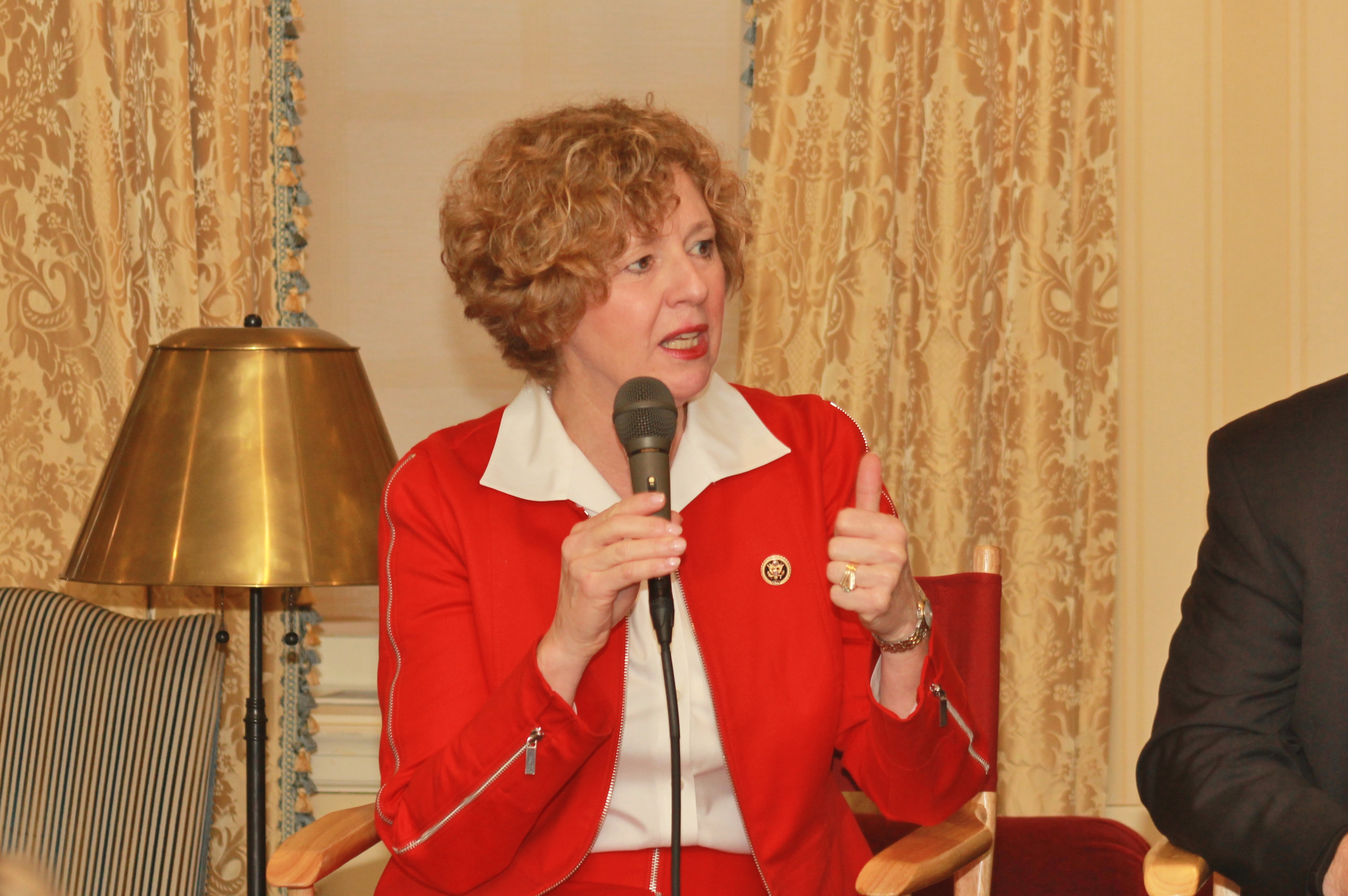 Murphy, Brooks & Bucshon Talk About the Mental Health Care Crisis in the United States and the Effort to Reform the Way People are Treated
Murphy, Brooks & Bucshon Talk About the Mental Health Care Crisis in the United States and the Effort to Reform the Way People are Treated
WASHINGTON, DC – The Ripon Society held a breakfast discussion yesterday morning focusing on the mental health care crisis in the United States and the effort gaining momentum on Capitol Hill to reform the way people are treated and cared for in this country.
The effort is being led by Congressman Tim Murphy (PA-18), who led the discussion and was joined by two other key voices in the debate – Congresswoman Susan Brooks (IN-5) and Congressman Larry Bucshon (IN-8). Murphy opened the discussion by talking about the scope of the problem, and the investigation he is leading as Chairman of the Energy & Commerce Subcommittee on Oversight and Investigations to come up with a solution and restore some common sense – and compassion – to the law.
“Let me tell you some statistics,” the Pennsylvania lawmaker began. “In the time I’ve been talking since I walked to the podium, two people have tried to commit suicide in this country. There are 1.2 million suicide attempts each year, serious enough to require medical care. There will be 41,000 suicide deaths in this country this year. There will be 43,000 drug overdose deaths. There will be about 1,500 homicides by someone with a mental illness. And an unknown number – maybe a couple thousand, maybe five thousand, maybe more – of people who died that slow-motion death of serious mental illness because they have so many other chronic illnesses, like diabetes, heart disease, lung disease, and infections. Or those who will die on the park bench or subway grate because that is their home.
“When you add those numbers up, this year we will have more people who die of mental illness and its complications than the total combat deaths of Korea, Vietnam, and probably also Afghanistan and Iraq. We can’t tolerate this anymore. The headlines that hit us from this bloody summer of 2015 – about Oregon, Dallas, Houston, Chattanooga, Charlotte; the list goes on. It was an ugly summer. But it ought to tell us that something is broken in this system. And indeed it is. What our investigation told us, and I was amazed at this, is there are 112 federal programs dealing with mental illness. There are 24 or 26 programs for the homeless, alone. While we are spending all this money – about $130 billion a year, the vast majority of that in disability payments – suicides went up and drug overdose deaths went up. By comparison, we have seen mortality rates in the last 10 years decline for heart disease, strokes, AIDS, and auto accidents. So something is wrong with what we are doing.”
 Murphy was elected to the House of Representatives in 2002 and has over 30 years of experience as a psychologist. He is Co-chair of the Mental Health Caucus and a founding member of the GOP Doctors Caucus. But it is in his role as Chair of the Oversight and Investigations Subcommittee that Murphy is having the biggest impact, by not only calling attention to the failures of the current system, but by putting forward a comprehensive plan for reform.
Murphy was elected to the House of Representatives in 2002 and has over 30 years of experience as a psychologist. He is Co-chair of the Mental Health Caucus and a founding member of the GOP Doctors Caucus. But it is in his role as Chair of the Oversight and Investigations Subcommittee that Murphy is having the biggest impact, by not only calling attention to the failures of the current system, but by putting forward a comprehensive plan for reform.
“What our Subcommittee has found over the last couple of years is an amazing number of problems,” he revealed. “Those 112 federal programs? They haven’t met since 2009 to coordinate their services. The grant programs, according to a GAO report, don’t even ask for accountability. They don’t even ask for data when somebody gets the money. What did you do? How did you spend it? Did you get results? What we do know is the kind of grant that the lead federal organization on this, SAMHSA, chooses to fund.
“For example, they have been funding workshops that tell people how to get off their medication; workshops on how to make collages or masks to describe their feelings; a website that went up last winter to help people in Boston deal with snow anxiety, along with an 1-800 number they could call; $22,500 spent on a painting of two people sitting on a rock surrounded by other people sitting on a rock for mental health awareness; and, something like $426,000 on a website with animated characters and sing-along songs for 3-year olds to help with self-esteem. But in the 40,000 word document describing this organization, not once did they mention the words schizophrenia or bipolar. We also found federal programs that discriminate against those with low income. Not only do we have a broken system that is neglectful and abusive toward those with serious mental illness, it is worse for minorities and those with low incomes.”
To address these and other failures of the nation’s mental health care system, Murphy has authored what is widely viewed as one of the most comprehensive reform plans introduced in many years. The plan is called the Helping Families in Mental Health Crisis Act. According to Murphy, the plan would fix the mental health system by refocusing programs, reforming grants, and removing federal barriers to care. Among other things, the plan would create an Assistant Secretary for Mental Health and Substance Use Disorders within the Department of Health & Human Services to give mental health issues greater visibility and importance within the federal bureaucracy. The plan would also change Medicaid rules so young people can see a pediatrician and psychologist on the same day, and increase the number of beds in U.S. hospitals dedicated to improving mental health care. The plan would also authorize a national strategy to increase the number of psychiatrists and other mental health professionals, and establish a Minority Fellowship Program in this area, as well.
Murphy noted that the Helping Families in Mental Health Crisis Act is scheduled to be marked up next week by the Energy & Commerce Subcommittee on Health. He also noted that support is building for the plan across the United States – it has been endorsed by 23 professional organizations and at least 45 newspapers. The plan is also supported by a bipartisan – and growing – group of 154 Members of the House.
That group includes Congressman Bucshon and Congresswoman Brooks, who, in remarks at the discussion, praised Murphy for his leadership on the issue and talked about their own experience with the mental health system, as well.
 “I have been an attorney for 30 years,” Brooks stated. “In my first 13 years of practice, I was a criminal defense attorney. I have been in many jails and prisons, and they are filled with people with mental illness. Our jails are actually like mental health institutions, in many ways, and people are not getting the help that they need. Mental illness or substance abuse is often what leads people into the criminal justice system.”
“I have been an attorney for 30 years,” Brooks stated. “In my first 13 years of practice, I was a criminal defense attorney. I have been in many jails and prisons, and they are filled with people with mental illness. Our jails are actually like mental health institutions, in many ways, and people are not getting the help that they need. Mental illness or substance abuse is often what leads people into the criminal justice system.”
Noting that she has held roundtables on the crisis with mental health professionals, the Indiana legislator also pointed to the shortage of professionals in the field. “We will graduate from IU medical school maybe 350 students in a year. Of those, maybe three will go into psychiatry. Think about that – three out of 300. So we have a huge need for behavioral health and mental health professionals. We don’t have enough providers. We don’t have enough beds. And we don’t have enough treatment. That’s why I love what Tim is doing to shine a light on this need.
Bucshon agreed.
 “I am also passionate about this issue,” stated the Hoosier State Representative, who was a successful cardiothoracic surgeon before being elected to the House in 2010. “What Tim is doing is really important. We need to get past the fact that many people think that we can just talk to people. You can’t do that when you have serious depression problems without assistance.”
“I am also passionate about this issue,” stated the Hoosier State Representative, who was a successful cardiothoracic surgeon before being elected to the House in 2010. “What Tim is doing is really important. We need to get past the fact that many people think that we can just talk to people. You can’t do that when you have serious depression problems without assistance.”
Saying that mental illnesses should be treated no differently than physical illnesses, he continued: “You certainly wouldn’t ignore an appendicitis. You’d treat it with surgery. So you have to treat these diseases properly, as well. The other thing we need to do is get past the stigma — not only in public, but among health care providers. We need to get health care providers more involved in referring their patients to medical professional like Tim who understand how to treat mental illness.”
Yesterday’s breakfast discussion was kicked off by Ripon Society President & CEO Jim Conzelman, who, in his opening remarks, noted that The Ripon Society has a long history of supporting mental health care reform. “In February of 1967,” he stated, “we published a special report on the issue that was written by one of our founders, Tom Petri. In it, the future Wisconsin Congressman pointed out that one out of ten Americans will at some point suffer from some kind of mental illness. And he wrote: ‘Too many of us have been too indifferent about the problems associated with mental health for too long.’
“That was almost 50 years ago. Since then, I think it’s safe to say the problems have only gotten worse. In the Winter of last year, The Ripon Forum dedicated an entire edition to the challenges we face in this regard. This edition focused on the good work being done on the issue by Congressman Murphy. We are honored to have him with us, and look forward to hearing from him and two other leaders in the fight to reform our nation’s mental health system – Congresswoman Brooks and Congressman Bucshon.”
To view the complete remarks of Reps. Murphy, Brooks and Bucshon before The Ripon Society breakfast discussion, please click on the link below:
[youtube http://www.youtube.com/watch?v=Kj2uogF4YDo]
The Ripon Society is a public policy organization that was founded in 1962 and takes its name from the town where the Republican Party was born in 1854 – Ripon, Wisconsin. One of the main goals of The Ripon Society is to promote the ideas and principles that have made America great and contributed to the GOP’s success. These ideas include keeping our nation secure, keeping taxes low and having a federal government that is smaller, smarter and more accountable to the people.



